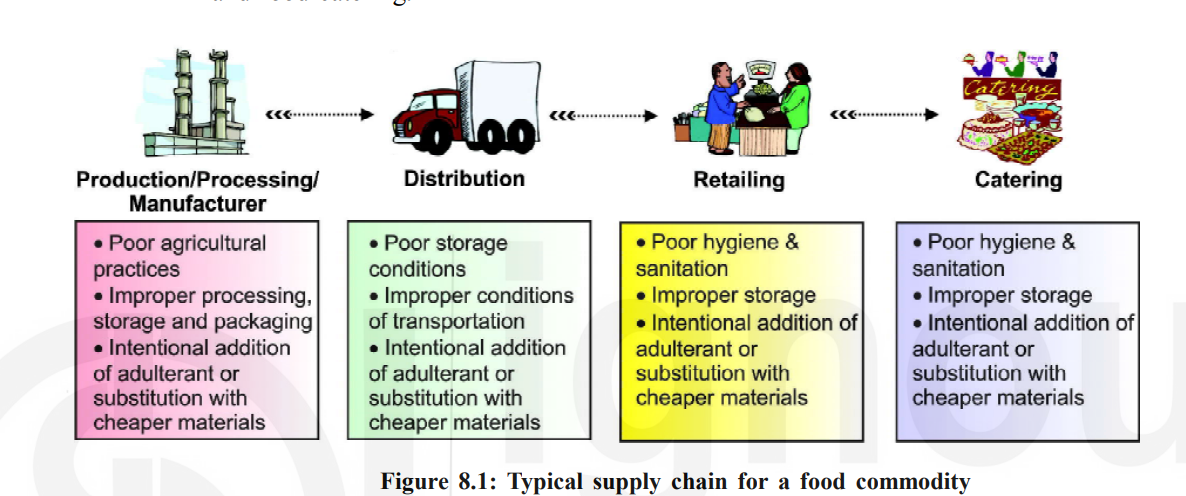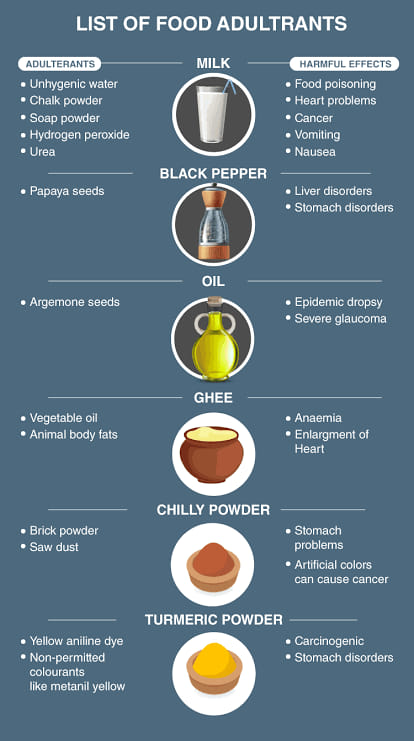A Call for Action to Battle Food Adulteration | 26 Apr 2025
This editorial is based on "India has a serious food adulteration problem," which was published in the Indian Express on 22/04/2025. The article highlights the state of food adulteration in India, presenting case studies and addressing regulatory issues related to food safety. It also suggests remedies to tackle the issue of food adulteration in India.
For Prelims: FSSAI, Ethylene oxide, Monosodium glutamate (MSG), Pradhan Mantri Formalisation of Micro Food Processing Enterprises Scheme, Blockchain, Repurpose Used Cooking Oil (RUCO), One Health approach, Sustainable Development Goal, PM Kaushal Vikas Yojana, PM Internship Scheme, WHO, NFSA, Consumer Protection Act
For Mains: Food Adulteration in India, Related Issues, Challenges and Measures.
Food adulteration in India has become a pressing issue, affecting millions of citizens and causing irreversible harm to public health. Despite a robust regulatory framework, the practice continues to thrive due to a lack of effective enforcement, widespread corruption, and limited consumer awareness. The government's efforts through the Food Safety and Standards Authority of India (FSSAI) and state-level food authorities are commendable, yet they remain insufficient in curbing this menace.
What is Food Adulteration?
- As per FSSAI, food adulteration refers to the intentional addition, substitution, or removal of substances that negatively impact the nature, quality, or safety of food.
- It also includes unintentional contamination that may occur during cultivation, harvesting, storage, processing, transportation, or distribution.
- Type of Adulterants in Different Food Items:
What is the State of Food Adulteration in India?
- Prevalence of Adulteration: According to the Food Safety and Standards Authority of India (FSSAI), around 26.4% of the food samples tested in 2018–19 were found to be adulterated, compared to 23.4% in 2016–17.
- In 2023–24, the FSSAI analyzed over 1.5 lakh food samples, of which more than 33,000 were found to be non-conforming.
- The most commonly found adulterants include non-food substances that are added to food products to either increase their weight or improve their appearance.
- Nestlé India's Maggi noodles were found to contain excessive levels of lead and monosodium glutamate (MSG).
- High Adulteration Rates: In 2024, nearly 25% of food samples tested in Rajasthan were found adulterated, leading to the seizure or destruction of over 6.6 lakh kilograms of food products.
- Dairy Products Under Scrutiny: A significant 83% of paneer samples in Noida and Greater Noida failed quality tests, with 40% deemed unsafe due to harmful chemicals and unidentified substances.
- Spice Contamination: Approximately 12% of spice samples tested nationwide failed to meet safety standards, raising concerns over pesticide residues and other contaminants.
- Example: MDH and Everest spices have been found adulterated with ethylene oxide, a carcinogenic pesticide, leading to product recalls in countries like Singapore and Hong Kong, and rejections in the United States due to contamination.
Why Food Adulteration Persists in India?
- Inadequate Enforcement of Food Safety Laws and Informal Market: The Food Safety and Standards Authority of India (FSSAI) faces challenges in implementing food safety laws effectively.
- About one-third of the food industry is unaware about the FSSA and therefore ignorant about the rules there under.
- India’s food supply chain is fragmented, with 80% of sales in informal markets lacking oversight.
- Lack of Comprehensive National-Level Policy: The absence of a unified and comprehensive national policy on food processing, both at the national and state levels, as well as between national and international standards, leads to varying regulatory practices across Indian states and creates a situation where adulterated food may be rejected by international buyers.
- For example, the permissible lead limits in food products differ between India and the WHO, with India allowing a higher permissible limit in some products, thereby undermining food safety efforts.
- Limited Resources in Food Processing Industries: Many food processing industries in India face resource constraints that hinder their ability to maintain proper hygiene and safety standards.
- Used frying oil is often repeatedly reused to cost-cutting measures, leading to the formation of harmful compounds like acrolein and trans fats, which can cause cardiovascular and gastrointestinal issues.
- The inability to dispose of residual food products and oils safely exacerbates the problem of adulteration.
- A shortage of trained manpower hampers the effective implementation of food safety standards, with a FICCI study noting that 25.53% of respondents identified it as a key challenge.
- Neglect of Supply Chain of Food Production: Neglect in monitoring and regulating the food production supply chain significantly contributes to food adulteration.
- For instance, the use of high-intensity pesticide chemicals in agriculture has been linked to heavy pesticide residues in final crop products, which later contaminate food (e.g., levels of ethylene oxide, a cancer-causing pesticide, found in MDH spices).
- Regulatory oversight for pesticide residues and other food safety laws is often inadequate, allowing contaminated food products to enter the supply chain.
- Substandard Supporting Infrastructure: The Code of Practice for Water Supply in Buildings, 1957 prohibits the use of lead pipes for domestic water supply, limiting lead concentrations to 10 µg/L in water.
- However, it permits lead piping for overflow systems which are sometimes used in food processing industries, leading to contamination of food with lead.
- Substandard fortification also leads to food adulteration, such as when the fortification content is poorly mixed in rice.
- These issues are often concealed by misleading labeling that falsely claims the product's quality.
- This issue highlights the gaps in regulations that allow unsafe practices in the food industry, contributing to food adulteration and the risk of poisoning.
What are Legal and Policy Framework for Food Regulation in India?
- Food Safety and Standards Act (FSSA), 2006: The Act establishes the Food Safety and Standards Authority of India (FSSAI) to regulate and monitor the manufacture, processing, distribution, sale, and import of food to ensure safe and wholesome food for human consumption.
- The Act aimed at preventing the sale of adulterated food to safeguard public health and allows the government to specify food standards and ensure that food is free from harmful substances.
- Food Safety and Standards (Packaging and Labelling) Regulations, 2011: It governs the packaging and labelling of food products to ensure that consumers receive accurate information about the contents.
- They mandate clear labelling of ingredients, nutritional value, allergens, and expiry dates.
- National Food Security Act (NFSA), 2013: This Act ensures food security for vulnerable sections of society by providing access to safe and nutritious food.
- It also mandates that the food distributed under the Act be safe, hygienic, and free from adulteration.
- The Consumer Protection Act, 2019: The Act safeguards consumers against unfair trade practices, including food adulteration.
- It grants consumers the right to seek compensation for harm caused by adulterated food and empowers regulatory bodies like the FSSAI to take strict action against violators.
- FSSAI’s DART (Detect Adulteration with Rapid Test) Manual: The DART manual provides a user-friendly guide to help consumers detect food adulteration through simple and rapid tests.
- It supports public awareness through educational campaigns and promotes active consumer participation in identifying common adulterants in food.
What Steps Need to be Taken to Address the Food Adulteration?
- Formalization of the Food Processing Industry: There is a need for more formalization of the food processing industry under schemes like the Pradhan Mantri Formalisation of Micro Food Processing Enterprises Scheme.
- This will bring more of the industry under regulation, create a more consolidated food market, and improve the processing sector.
- Comprehensive Food Regulation Policy: India needs a more comprehensive food regulation policy by amending the Food Safety and Standards Act (FSSA) and aligning it with international standards.
- This will not only help boost the food export market but also create a robust food regulation framework for a proactive health ecosystem.
- This will align with global goals such as Sustainable Development Goal 2.1 (end hunger) and 3.3 (combat diseases).
- Adequate Resources: There is a need for a larger, skilled workforce in the food processing industry. Policies such as PM Kaushal Vikas Yojana and PM Internship Scheme should be extended to ensure industry-ready, skilled workers.
- Promoting collaboration between industry and academia will ensure the youth are equipped with cutting-edge skills.
- Stronger Surveillance and Penalties: FSSAI must intensify its surveillance and sampling of food products, coupled with stricter penalties for offenders.
- There should also be more stringent deterrents in the form of fines and punishments to prevent practices like adulteration, which are often used as cost-cutting measures.
- Expand Mobile Laboratories: The “Food Safety on Wheels” mobile laboratories must be expanded to cover all regions.
- Portable testing technologies such as spectrometers and DNA-based tests should be used for quick on-site detection of common adulterants.
- Addressing Technical Errors: Substandard fortification and misleading labeling are major issues. The government should address these issues to improve food quality, which is often overlooked by consumers.
- Enhanced monitoring and verification systems must be implemented to ensure correct fortification and proper labeling.
- Streamline the Supply Chain: A streamlined supply chain must be established to manage food processing residues, such as reused cooking oil.
- Initiatives like Repurpose Used Cooking Oil (RUCO) should be promoted to prevent the continuous reuse of frying oil, which leads to harmful health effects.
- Adopt the One Health Approach: The One Health approach should be adopted, addressing both food adulteration and related issues in food processing.
- One Health approach will cover both direct and indirect forms of adulteration, such as pesticide residues in crops and antibiotics in meat, as well as contamination from upstream and downstream supply chains (e.g., lead in water pipes).
- Use of Cutting-Edge Technology: Introduce mandatory traceability systems for high-risk foods like milk, spices, and oils.
- Implement blockchain or QR-code systems to ensure transparency and allow for swift action if adulteration is detected.
- Blockchain will help ensure transparency, enabling real-time verification and reducing food fraud.
- Consumer Awareness Campaigns: Increase consumer awareness through educational programs and the widespread distribution of FSSAI's DART (Detect Adulterants with Rapid Testing) manual. Encourage citizens to report adulterated products via mobile apps and helplines.
Conclusion
Food adulteration in India poses a serious threat to public health, food security, and consumer rights. While regulatory frameworks like the FSSA and initiatives by FSSAI provide a foundation, the persistent gaps in enforcement, resource availability, and supply chain regulation demand urgent reforms. A comprehensive and coordinated approach, focusing on regulatory strengthening, technological adoption, industry formalization, and consumer empowerment—is essential to address this systemic issue. Only through sustained government action, responsible industry practices, and informed public participation can India ensure the availability of safe, unadulterated food for all.
|
Drishti Mains Question: Food adulteration in India reflects deep-rooted governance and regulatory challenges in ensuring food safety. Critically examine the causes and implications of food adulteration. Suggest comprehensive measures to address this issue effectively. |
UPSC Civil Services Examination Previous Year’s Question (PYQs)
Prelims:
Q. Consider the following statements: (2018)
- The Food Safety and Standards Act, 2006 replaced the Prevention of Food Adulteration Act, 1954.
- The Food Safety and Standards Authority of India (FSSAI) is under the charge of Director General of Health Services in the Union Ministry of Health and Family Welfare.
Which of the statements given above is/are correct?
(a) 1 only
(b) 2 only
(c) Both 1 and 2
(d) Neither 1 nor 2
Ans: (a)
Mains:
Q. Elaborate the policy taken by the Government of India to meet the challenges of the food processing sector. (2021)


